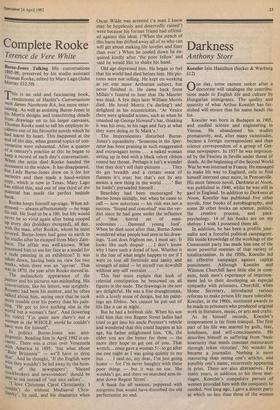Complete Rooke
Terence de Vere White
Burne-Jones Talking His conversations 1895-98, preserved by his studio assistant Thomas Rooke, edited by Mary Lago (John Murray £12.50) This is an odd and fascinating book, reminiscent of Hazlitt's Conversations with James Northcote RA, but more enter- taining. As well as assisting Burne-Jones in his Morris designs and transferring details from drawings on to his larger canvases, Thomas Rooke used to tell his employer in- cidents out of his favourite novels which he had learnt by heart. This happened at the end of the day, when general topics of con- versation were exhausted. After a quarter of a century's practice at this he began to keep a record of each day's conversations. When the artist died Rooke handed the document to the widow. It has disappeared, but Lady Burne-Jones drew on it for her memoirs and then made a hand-written copy, which is now in Texas. Mary Lago has edited this, and out of one third of the Material has made the perfect bedside book.
Rooke keeps himself up-stage. When ad- dressed — always affectionately — he wags his tail. He lived to be a 100, but life would never be so vivid again after being cooped UP every day (holidays excepted), all day, with the man, after Ruskin, whom he most revered. Burne-Jones had gone to earth in his studio after he escaped from Mary Zam- bac°. The affair was well-known. What Possessed him to use her face as a model for a nude painting in an exhibition? It was taken down, having been on view for two weeks, when there was an 'uproar'. That was in 1870, the year after Rooke moved in. The melancholy appearance of the Painter and his pictures was misleading. His conversation, like his letters, was sprightly. Rossetti had been his mentor, and he often talked about him, saying once that he took more trouble over his poetry than his pain- ting. 'He got to love nothing else in the world but a woman's face'. And (lowering his voice) `I'm quite sure there's not a woman in the WHOLE world he couldn't have won for himself'.
In politics Burne-Jones was anti- Jingoistic. Reading him in April 1982 is un- canny. There was a crisis over Venezuela with America in 1895: 'but what about "Rule Britannia" — we'll have to drop that'. And he thought, 'If the English were wise they wouldn't be led away by the bom- bast of the newspapers'; 'blasted stockbrokers and newsvendors' should be sent to sea instead of 'our nice sailors'.
I love Christmas Carol Christianity. I couldn't do without Mediaeval Chris- tianity% he said, and his dramatics when
may be hopelessly and deservedly ruined') were because his former friend had offend- ed against this ideal. ('When the stench of this harm has drifted away all of us who can will get about making life lovelier and finer than ever'.) When he cooled down he en- quired kindly after 'the poor fellow' and said he would like to shake his hand.
Old age depressed him. He began to feel that his world had died before him. His pic- tures were not selling. He kept on working at yet one more Arthurian subject, but never finished it. He came back from Millais's funeral to hear that Du Maurier was dead. A few days later William Morris died. He loved Morris Ca darling') and delighted in his eccentricities. 'At Venice there were splendid scenes, such as when he smashed up George Howard's hat, thinking it was his own, in his rage and fury at what they were doing to St Mark's.'
The Impressionists disturbed Burne- Jones's equanimity. 'Someone in the Spec- tator has been praising in such exaggerated and extravagant terms ... a naked woman sitting up in bed with a black velvet ribbon round her throat. Perhaps it isn't a wonder that they don't sell their pictures .... They do get breadth and a certain sense of flatness it's true; but that's not by any means a new thing in the world ....' But he hadn't persuaded himself.
Beardsley had been encouraged by Burne-Jones initially, but when he came to call — now notorious — his visit was not a success. 'Stupid and conceited' was the ver- dict since he had gone under the influence of 'that horrid set of semi- sodomites .... Damned young fool'. When he died soon after that, Burne-Jones wondered what people had seen in his draw- ings. 'Lust does frighten me, I must say. It looks like such despair ... I don't know why 1 have such a dread of lust. Whether it is the fear of what might happen to me if I were to lose all fortitude and sanity and strength of mind — let myself run downhill without any self restraint ....
This fear must explain that look of celestial constipation he bestowed on all figures in the nude. The drawings in the text are delightful. He was a fine draughtsman, with a lovely sense of design, but his paint- ings are lifeless. Sex cannot be put out of life like a cat at night.
But he had a bobbish side. When his son told him that two Regent Street ladies had tried to get into his uncle Poynter's vehicle and wondered that this could happen at his age, his father enlightened him. `Oh, the older you are the better for them — the more they hope to get out of you. That wretch... once gave a woman 5/- to go after me one night as I was going quietly to my bus . . I said no, my dear, I'm just going home — for I'm never haughty with these poor things — but it was no use. She wouldn't go, and there we marched arm-in- arm down Regent Street'.
A book for all seasons, peppered with misprints that would have disturbed the old perfectionist no end.






































 Previous page
Previous page